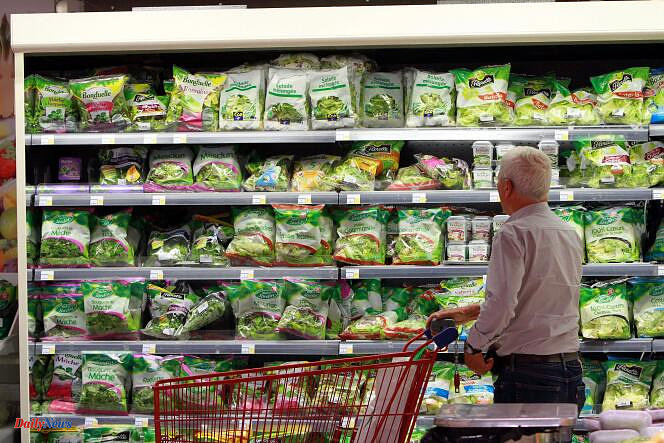The majority of packaged salads contain pesticide residues, warns 60 million consumers in an article published Thursday March 28. Of the twenty-six references analyzed by the magazine, “only five are free from contamination: two lettuces and three lamb’s lettuce.” For the rest, “an average of 3.8 pesticide residues per contaminated salad” was observed, reports the journal, which refers to “disappointing, even worrying” results.
The problem is all the more alarming as it potentially concerns the nearly seven out of ten households who buy bagged salads. Even though they are more expensive, they are considered more practical compared to “traditional” salads, which must be cut, washed and drained.
60 million consumers sifted through different types of salads (classic and iceberg lettuce, as well as lamb's lettuce), conventional or organic, both national brands (Bonduelle, Florette, Les Crudettes) and distributor brands (Aldi, Lidl, Carrefour, Monoprix, Intermarché, E. Leclerc, etc.).
“Cocktail” of molecules
The magazine points out that “this vegetable is exposed to diseases that are difficult to treat without the help of fungicides and insecticides.” Due to the frequent use of pesticides, packaged salad "is a food regularly recalled by fraud repression, for exceeding legal residue limits", further notes the magazine. And the “cocktail” of molecules found in bagged salads contains “eight molecules suspected of having at least one “carcinogenic, mutagenic or toxic for reproduction” (CMR) action.
In all, “eleven lettuces contain one or more potentially CMR pesticide residues,” notes 60 million consumers, who adds that “the quantities found are within regulatory limits, even for the highest (0.18 mg/kg of metaflumizone ) of the test”. There is therefore, “theoretically, no health risk. But to date, scientists know almost nothing about the cocktail effects between all these molecules,” the magazine summarizes.
Furthermore, all the lettuces analyzed contain “non-CMR pesticides”, which “present a lower risk, or even almost zero for some”. And, all pesticides combined, “the worst performers have up to nine residues in the same salad”, reports another 60 million consumers.
Concerning lamb's lettuce, "only four references are concerned by suspected CMR molecules". “Even if the scores are generally better than for lettuce, we remain disappointed by the omnipresence of pesticides,” summarizes the review.












